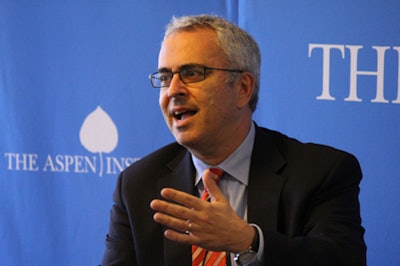The Aspen Institute’s College Excellence Program will expand its efforts to train and prepare aspiring and current community college leaders thanks to a new $3.2 million grant from the JPMorgan Chase Foundation announced this week.
 Linda Perlstein
Linda PerlsteinAspen’s grant award is part of a five-year, $350 million investment by JPMorgan Chase to equip individuals with the skills they need to succeed in high-demand and emerging industries such as information technology, healthcare and advanced manufacturing.
The “New Skills at Work” program’s significant support of community colleges and other non-traditional career pathways is part of the bank’s efforts to align education and job training with employer and industry needs in order to boost economic opportunity and career mobility, particularly for underserved groups.
“It’s good to see JPMorgan Chase validate community colleges as both a driver of the economy in local communities, but also a stepping stone for social mobility for Americans,” said Linda Perlstein, associate director of Aspen’s College Excellence Program. “That really aligns with what we’ve tried to do with the College Excellence Program.”
Current initiatives under the College Excellence Program support community colleges in their work to meet the needs of their local economies in a way that also meets the needs of their students from diverse backgrounds, Perlstein said. The $3.2 million grant funding will be used to launch the Aspen New Presidents Institute, and to enhance existing support for the Aspen Presidential Fellowship for Community College Excellence – now in its third year.
The Aspen Presidential Fellowship is a 10-month long professional development program for aspiring community college leaders that includes three week-long residential seminars, a mentoring component and a capstone project on student success. Since the program’s inception, the program has successfully placed 32 presidents at institutions that collectively serve nearly 500,000 students.
By design, two-thirds of presidential fellows are women – which is double that of current female community college presidents, Perlstein said. In addition, 37 percent of fellows are people of color compared to the current 29 percent of sitting community college leaders.
The structure and timeframe of the New Presidents Institute will be a little different to reflect the demands of sitting presidents. After identifying the differences in how the Aspen New Presidents Institute will be delivered, officials have a goal to launch the New Presidents Institute by spring 2020. Applications for the institute will open later this year.
“The content will be a little different because when you’re in the presidency, you have some pressing problems to solve that aren’t the same as when you’re aspiring to a presidency or preparing for one,” Perlstein noted.
Currently, Aspen Presidential Fellows receive support for how to develop a “theory of change” for their institution: “What is it that needs to improve and what do they believe to be key to moving that work forward? How do they build urgency for change? What kinds of partnerships are important to build?” Perlstein said.
Regarding the domain for student success, Aspen emphasizes improving teaching and learning, improving labor market outcomes, improving transfer outcomes, understanding the student experience and leading with equity in mind.
“What distinguishes our outlook is that, to us, a successful college is not just focused on getting students to graduate. It’s really paying attention to how well they’re positioning the student for what comes next after graduation, whether it’s moving right into the labor market or furthering their education,” Perlstein said.
In a statement announcing the bank’s global initiative, JPMorgan Chase and Co. chairman and CEO Jamie Dimon said, “The new world of work is about skills, not necessarily degrees.”
“We must remove the stigma of a community college and career education, look for opportunities to upskill or reskill workers and give those who have been left behind the chance to compete for well-paying careers today and tomorrow,” Dimon said.
Officials note that JPMorgan’s latest investment in community college leadership development is “critical” as four in five community college presidents are expected to retire in the next ten years and as presidents increasingly face challenges in their roles.
“There’s huge turnover in the field,” Perlstein said of community college leaders. And because there is no traditional path to the community college presidency, “there’s almost nothing” that can fully prepare you for the job of running a college, Perlstein said.
 Josh Wyner
Josh WynerThe work of the president has multiple roles: promoting internal systems change in the name of student success, improving outcomes for students pre- and post-graduation, and building strategic partnerships with employers, other educational institutions and community-based organizations.
Josh Wyner, executive director of the College Excellence Program and an Aspen Institute vice president, said great leaders are key to the work of community colleges improving the outcomes of their students, especially those “whom the system too often leaves behind.”
“We are thrilled that this investment will expand our ability to develop exceptional community college presidents committed to and capable of transformational change.”
Aspen officials want aspiring and current college leaders to look to the institute as an ongoing resource, Perlstein said.
“We want to be able to help people with the broad frameworks we believe are important at Aspen and that are proven practices in the field,” she said. “At the same time, we’re giving people what they need to solve the specific challenges they’re facing on a day-to-day basis.”
Tiffany Pennamon can be reached at [email protected]. You can follow her on Twitter @tiffanypennamon.















